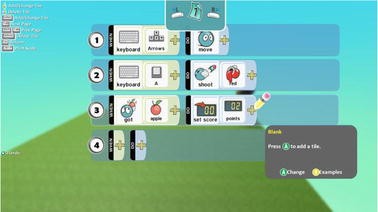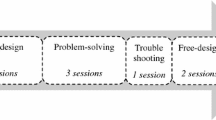Abstract
In this mixed-methods study, we examined if students benefitted from a game design course offered during an enrichment hour in terms of gains in their system analysis and design skills. Students at a rural middle school in Southeast US (n = 19) attended a 1-hour game design course offered weekly during an academic enrichment class period, for the duration of a school year, learning basics of digital game-design and practicing system design skills such as making flowcharts. The results of quasi-experimental data indicated that the treatment group’s pretest–posttest system analysis and design skills, compared to the control group, which did not receive any training, further improved, F(1,33) = 16.516, p < 0.001. Results from the interviews showed that the participants were able to verbalize how they applied system analysis and design skills developed during the course to problem-solving in different contexts. We discussed the instructional aspects of learning game-design that align with systems thinking. We also explored the possible influence of initial cognitive skills on student learning outcomes from such interventions.


Similar content being viewed by others
References
Akcaoglu, M. (2014). Learning problem-solving through making games. Educational Technology Research and Development, 62(5), 583–600. https://doi.org/10.1007/s11423-014-9347-4.
Akcaoglu, M. (2016). Design and implementation of the game-design and learning program. TechTrends, 60(2), 114–123. https://doi.org/10.1007/s11528-016-0022-y.
Akcaoglu, M., Gutierrez, A. P., Sonnleitner, P., & Hodges, C. B. (2016). Game design as a complex problem solving process. In R. Zheng & M. Gardner (Eds.), Handbook of research on serious games for educational applications (pp. 217–233). Hershey: IGN Publishing.
Akcaoglu, M., & Koehler, M. J. (2014). Cognitive outcomes from the Game-Design and Learning (GDL) after-school program. Computers and Education, 75, 72–81. https://doi.org/10.1016/j.compedu.2014.02.003.
An, Y. J. (2016). A case study of educational computer game design by middle school students. Educational Technology Research and Development, 64(4), 555–571. https://doi.org/10.1007/s11423-016-9428-7.
Assaraf, O. B. Z., & Orion, N. (2005). Development of system thinking skills in the context of earth system education. Journal of Research in Science Teaching, 42(5), 518–560.
Baytak, A., & Land, S. M. (2010). A case study of educational game design by kids and for kids. Procedia—Social and Behavioral Sciences, 2(2), 5242–5246. https://doi.org/10.1016/j.sbspro.2010.03.853.
Baytak, A., & Land, S. M. (2011). An investigation of the artifacts and process of constructing computers games about environmental science in a fifth grade classroom. Educational Technology Research and Development, 59(6), 765–782. https://doi.org/10.1007/s11423-010-9184-z.
Brown, J. S., Collins, A., & Duguid, P. (1989). Situated cognition and the culture of learning. Educational Researcher, 18(1), 32–42.
Cabrera, D., Cabrera, L., & Powers, E. (2015). A unifying theory of systems thinking with psychosocial applications. Systems Research and Behavioral Science, 32(5), 534–545.
Cohen, P., Cohen, J., Aiken, L. S., & West, S. G. (1999). The problem of units and the circumstance for POMP. Multivariate Behavioral Research, 34(3), 315–346.
Crawford, C. (1984). The art of computer game design. Berkeley: McGraw-Hill/Osborne Media.
Crawford, C. (2003). Chris Crawford on game design. Indiana: New Riders.
de Vries, E. (2006). Students’ construction of external representations in design-based learning situations. Learning and Instruction, 16, 213–227.
Denner, J., Werner, L., & Ortiz, E. (2012). Computer games created by middle school girls: Can they be used to measure understanding of computer science concepts? Computers and Education, 58(1), 240–249.
Dym, C. L., Agogino, A. M., Eris, O., Frey, D. D., & Leifer, L. J. (2005). Engineering design thinking, teaching, and learning. Journal of Engineering Education, 94(1), 103–120.
Fullerton, T. (2008). Game design workshop. Boston: Elsevier.
Goodman, M., & Stroh, D. P. (2008). Importance of systems thinking. http://www.appliedsystemsthinking.com/.
Honey, M., & Kanter, D. E. (Eds.). (2013). Design, make, play: Growing the next generation of STEM innovators. New York: Routledge.
Hsieh, H.-F., & Shannon, S. E. (2005). Three approaches to qualitative content analysis. Qualitative Health Research, 15(9), 1277–1288.
Hung, W. (2008). Enhancing systems-thinking skills with modelling. British Journal of Educational Technology, 39(6), 1099–1120.
Hwang, G.-J., Hung, C.-M., & Chen, N.-S. (2013). Improving learning achievements, motivations and problem-solving skills through a peer assessment-based game development approach. Educational Technology Research and Development. https://doi.org/10.1007/s11423-013-9320-7.
Jonassen, D. H. (1997). Instructional design models for well-structured and ill-structured problem-solving learning outcomes. Educational Technology Research and Design, 45, 65–94.
Jonassen, D. H. (2000). Toward a design theory of problem solving. Educational Technology Research and Design, 48, 63–85.
Kafai, Y. B., & Burke, Q. (2015). Constructionist gaming: Understanding the benefits of making games for learning. Educational Psychologist, 50(4), 313–334.
Kali, Y., Orion, N., & Eylon, B. S. (2003). Effect of knowledge integration activities on students’ perception of the Earth’s crust as a cyclic system. Journal of Research in Science Teaching, 40(6), 545–565.
Ke, F. (2014). An implementation of design-based learning through creating educational computer games: A case study on mathematics learning during design and computing. Computers and Education, 73, 26–39.
Mayer, R. E. (2016). What should be the role of computer games in education? Policy Insights from the Behavioral and Brain Sciences, 3(1), 20–26. https://doi.org/10.1177/2372732215621311.
Mayer, R. E., & Wittrock, M. C. (2006). Problem solving. In P. A. Alexander & P. H. Winne (Eds.), Handbook of educational psychology (pp. 287–303). Mahwah: Lawrence Erlbaum Associates.
Mayring, P. (2000). Qualitative content analysis. Forum: Qualitative Social Research. https://doi.org/10.17169/fqs-1.2.1089.
Nelson, W. A. (2003). Problem solving through design. New Directions for Teaching and Learning, 95, 39–44.
Norman, C. D. (2013). Teaching systems thinking and complexity theory in health sciences. Journal of Evaluation in Clinical Practice, 19(6), 1087–1089.
OECD. (2003). PISA 2003 Assessment framework: Mathematics, reading, science and problem solving knowledge and skills. Paris: OECD. https://www.oecd.org.
OECD. (2005). PISA 2003 technical report. Paris: OECD Publishing.
Öllinger, M., Hammon, S., von Grundherr, M., & Funke, J. (2015). Does visualization enhance complex problem solving? The effect of causal mapping on performance in the computer-based microworld Tailorshop. Educational Technology Research and Development, 63(4), 621–637.
Polya, G. (1957). How to solve it. Garden City: Doubleday/Anchor.
Salen, K., Torres, R., Wolozin, L., Rufo-Tepper, R., & Shapiro, A. (2011). Quest to Learn: Developing the School for Digital Kids. Digital Media. The John D. and Catherine T. MacArthur Foundation Reports on Digital Media and Learning.
Salen, K., & Zimmerman, E. (2004). Rules of play. Cambridge: MIT Press.
Senge, P. M. (1990). The fifth discipline: The art and practice of the learning organization. New York: Doubleday.
Stolee, K. T., & Fristoe, T. (2011). Expressing computer science concepts through Kodu game lab. In Proceedings of the 42nd ACM Technical Symposium on Computer Science Education (pp. 99–104). ACM.
Sweeney, L. B., & Sterman, J. (2000). Bathtub dynamics: Initial results of a systems thinking inventory. System Dynamics Review, 16(4), 249–286. https://doi.org/10.1002/sdr.198.
Werner, L., Denner, J., & Campe, S. (2014). Children programming games: A strategy for measuring computational learning. ACM Transactions on Computing Education, 14(4), 24:1–24:22. https://doi.org/10.1145/2677091.
Zhang, J. (1997). The nature of external representations in problem solving. Cognitive Science, 21(2), 179–217. https://doi.org/10.1207/s15516709cog2102_3.
Acknowledgements
We would like to extend our sincerest gratitude to Dr. Tarcin for sharing his pearls of wisdom and unwavering support with us during the course of this research.
Author information
Authors and Affiliations
Corresponding author
Ethics declarations
Conflict of interest
The authors declare that they have no conflict of interest.
Appendix
Appendix
Interview questions
-
1.
Questions about the test
-
a.
look at items and ask how and why they solved it the way they did (how did you get this answer)
-
b.
when you were learning how to create games, were there things that helped you in thinking how to solve problems like these?
-
a.
-
2.
Questions about their game design, programming, and overall experience
-
a.
what did you like or didn’t like about the process of designing games?
-
b.
is there anything you wish you could do differently?
-
c.
is there anything that you wish you knew to make your game better?
-
d.
while making a game, when you are trying to program characters in your game (SCREENSHOT ATTACHED), what do you usually do? (for example, if you run into a challenge, what was your first instinct: raise hand, ask friend, ask instructor, online?) Why?
-
e.
Do you (or did you) continue to create games outside school?
-
i.
was this the game that you were already working on?
-
ii.
use Kodu?
-
i.
-
f.
Do you have any coding/programming experience (with any software/language)? Have you done anything like this before?

-
a.
Rights and permissions
About this article
Cite this article
Akcaoglu, M., Green, L.S. Teaching systems thinking through game design. Education Tech Research Dev 67, 1–19 (2019). https://doi.org/10.1007/s11423-018-9596-8
Published:
Issue Date:
DOI: https://doi.org/10.1007/s11423-018-9596-8





